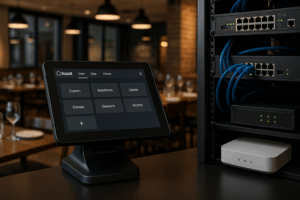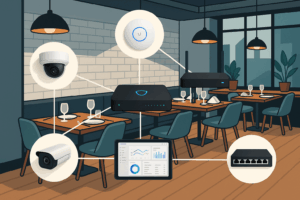Enhancing Restaurant Security: The Power of a Self-Managed Network
- Phone: +1(833)PHX-Geek
- 712 H St NE Suite 1904 Washington, D.C. 20002
Are you looking to come to Toast POS? Follow this link to sign up and get a free quote from your local Toast Rep. They will come out to your restaurant, and give you a free, no obligation quote.
Introduction
In an era where digital threats loom large, restaurants must prioritize security to protect their assets and customer data. A self-managed network offers a viable solution, allowing restaurant owners to take control of their security systems. By utilizing this technology, establishments can create a secure environment that effectively caters to the unique challenges faced in the hospitality industry. 
Self-managed networks enable restaurants to customize their security protocols according to their specific needs. These systems can be designed to monitor internal networks, control access points, and utilize encryption techniques to safeguard sensitive information. Moreover, the adaptability of self-managed networks helps restaurants stay ahead of potential threats while optimizing their operational efficiency.
By leveraging cloud technology and IoT devices, restaurant owners can also gain real-time insights into their network security. This proactive approach allows for immediate responses to potential breaches and offers a comprehensive understanding of network performance. As the threat landscape evolves, understanding self-managed networks becomes essential for restaurants aiming to enhance their security posture.
Incorporating enhanced security solutions within a self-managed network provides restaurants with several key benefits. First and foremost, these networks bolster protection against cyberattacks, minimizing the risk of breaches that can compromise sensitive customer data. With robust security measures in place, restaurants can foster trust among patrons, encouraging repeat visits and positive word-of-mouth.
Another significant advantage lies in the ability to streamline operations. Self-managed networks allow for centralized control of all security components, from surveillance cameras to payment processing systems. This integration not only simplifies management but also ensures that all devices are updated with the latest security patches, reducing vulnerabilities that could be exploited by malicious actors.
 Furthermore, enhanced security solutions can lead to cost savings in the long run. While the initial investment may seem steep, the ability to prevent costly data breaches and operational disruptions far outweighs the expenditure. As restaurants continue to navigate the complexities of modern-day security challenges, investing in a self-managed network emerges as a smart, forward-thinking strategy.
Furthermore, enhanced security solutions can lead to cost savings in the long run. While the initial investment may seem steep, the ability to prevent costly data breaches and operational disruptions far outweighs the expenditure. As restaurants continue to navigate the complexities of modern-day security challenges, investing in a self-managed network emerges as a smart, forward-thinking strategy.
The successful implementation of a self-managed network strategy begins with a thorough assessment of a restaurant's existing infrastructure. Owners should identify potential vulnerabilities and establish clear security objectives to address these gaps. This process often involves collaborating with IT professionals who can provide insights into the most effective security measures tailored to the unique needs of the establishment.
Once security objectives are established, the next step is to select the appropriate technology and tools to build the network. Restaurant owners should consider options such as firewalls, intrusion detection systems, and encrypted Wi-Fi connections. Additionally, training staff in security protocols is crucial, as human error remains one of the leading causes of data breaches.
Finally, ongoing monitoring and evaluation of the network's security is essential. Regular audits can help identify new threats and ensure that all components of the self-managed network remain functional and up-to-date. By consistently refining their security strategy, restaurants can create a resilient system that safeguards against emerging risks.
As technology continues to advance, the future of restaurant security is poised for significant transformation. One notable trend is the increasing integration of artificial intelligence (AI) into security systems. AI-driven solutions can analyze vast amounts of data to identify unusual patterns, enabling quicker responses to potential threats.
Moreover, the adoption of biometric security measures, such as facial recognition and fingerprint scanning, is expected to rise. These technologies can enhance access control and provide a more secure environment for both employees and customers. As restaurants look to adopt more sophisticated security measures, investing in cutting-edge technologies will be critical to staying ahead of threats.
 Additionally, the rise of remote monitoring solutions allows restaurant owners to oversee their security systems from anywhere, further enhancing operational flexibility. By embracing these future trends, restaurants can not only improve their security posture but also create a safer dining experience for their patrons.
Additionally, the rise of remote monitoring solutions allows restaurant owners to oversee their security systems from anywhere, further enhancing operational flexibility. By embracing these future trends, restaurants can not only improve their security posture but also create a safer dining experience for their patrons.
Conclusion
In summary, enhancing restaurant security with a self-managed network presents an array of opportunities to safeguard sensitive information and create a secure environment. By understanding the benefits, implementing effective strategies, and staying informed about future trends, restaurant owners can effectively protect their establishments while fostering customer trust and loyalty.